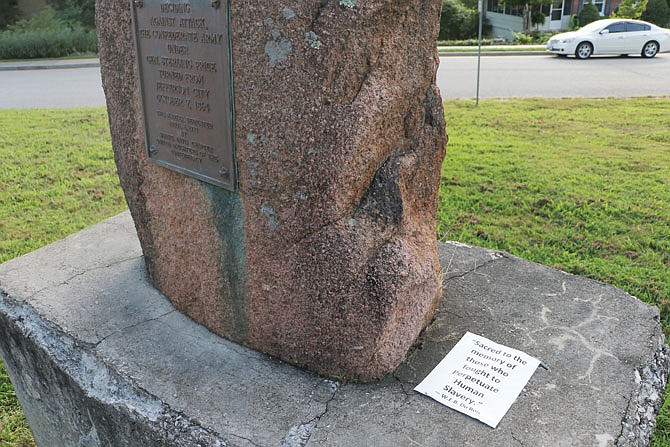Another group of voices has joined the discussion surrounding the large stone marker on Moreau Drive that recognizes a Civil War event that almost took place in Jefferson City.
The marker is a large brown stone on a gray stone base, bearing a plaque which reads "Deciding against attack, the Confederate Army under Gen. Sterling Price turned from Jefferson City October 7, 1864."
In 1864, Confederate forces, led by Gen. Sterling Price, planned to attack Jefferson City in order to secure a possible victory and help turn the tide of the war, which at that point was leaning toward the Union, which eventually won.
Price did not have his troops attack the city due to the strength of Union forces in the area, leading the event to be referred to as "the battle that never was."
The marker was dedicated April 6, 1933, by the Winnie Davis chapter of the United Daughters of the Confederacy.
Recently, conversations have begun about the future of the marker, with opinions ranging from removal or relocation to the possibility of additional historical markers to add context or leaving the stone alone all together.
The Jefferson City Racial Equity Group, NAACP and a group of residents announced Friday they plan to ask the Jefferson City Council to remove the marker, arguing it does not tell an accurate history of what happened in Jefferson City.
Former Missouri state Rep. Jay Barnes compiled historical research on Jefferson City's involvement in the Civil War and the history of the Price marker for the groups.
Barnes said, according to his research, the marker's position on Moreau Drive does not support historical data because there is nothing to prove Price was anywhere near that location when the decision was made not to attack Jefferson City.
"That marker is anti-historical," Barnes said. "There's nothing historical about the rock itself. There's nothing historical about that particular place. It makes Price the center of the history of our city, and Sterling Price should not be anywhere near the history of our city in the Civil War."
Because Price is said to have turned away from Jefferson City due to the strength of Union forces, Barnes argues the real tribute should be made to the other side, including Union troops, anti-slavery German immigrants and freed Black citizens.
"I think that Jefferson City has a history in the Civil War of which we should be very proud and we should celebrate," Barnes said.
Barnes proposes two actions for the city to take: Remove the marker, and begin the process to place historically accurate markers to honor the other elements of Jefferson City's history.
"The city should immediately start a process of creating markers and memorials to our city's actual history that, in 2020, we ought to be proud of," he said. "I would hope the city could erect monuments and markers throughout the town that bring us together as a community, rather than divide us."
Proposed markers include an exhibit on entrenchments at McClung Park, highlighting the contributions of German immigrants in the Munichburg district, and a marker recognizing the landing of a Union river boat near Jackson Street.
Barnes also proposed a downtown museum to highlight Jefferson City's full history relating to the Civil War, as well as a marker to commemorate Missouri's status as a refuge for escaping slaves to be placed potentially near or on Adrian's Island or the Bicentennial Bridge.
City commissions have also recently discussed the marker.
At its August meeting, the Jefferson City Historic Preservation Commission heard testimony from several who support the marker. The commission recommended that it not be removed.
In a planned letter to the Jefferson City Council, the Historic Preservation Commission will recommend the marker be placed within historical context through the addition of other markers.
Supporters at the meeting argued the marker does not glorify the Confederacy, but simply recognizes the event that took place - or almost took place - in Jefferson City during the Civil War. They suggested adding other markers for the Union forces and other historical context to the site, instead of removing the existing marker.
The Jefferson City Commission on Human Relations is in the process of drafting a letter in support of removing the marker. That letter will be sent to the City Council as well once it is complete, Chair Mitchell Woodrum said Friday.
Although they can send recommendations, neither the Historic Preservation Commission nor the Commission on Human Relations can take action on the marker.
Should a future decision on the marker be made, it would be up to the Jefferson City Council because the marker is on city property and is owned by the city, Associate City Attorney Bryan Woolford previously said.
This article was edited at 9:13 a.m. Aug. 24, 2020, to correctly identify Jay Barnes' former position as state representative.


